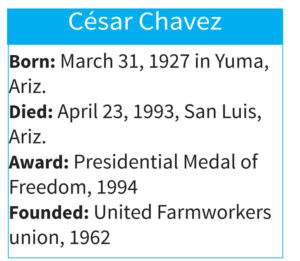Guest column by Andrea Sarabia – César Chavez — The man, the myth, the legend
Published in the April 18 – May 1, 2018 issue of Gilroy Life

Andrea Sarabia
Side by side in unity and in fight, César Chavez stood by his fellow farmworkers to fight for decent working rights. For many years, César Chavez has received great acknowledgment for helping the working class and being a leader of civil serviceship which will leave a legacy to be remembered for years to come. While his initial efforts were undermined by most, Chavez utilized his platform to highlight the injustices in the fields and to promote dignity for the workers.
While to some people César’s career achievements are the most relevant, his early life was fundamental to his development as a civil leader. On a small farm near Yuma, Arizona, César Estrada Chavez was born into a migrant farm working family in the year of 1927. Considering the fact that the Chavez family worked in the fields, in more than one occasion they were forced to relocate and follow the crops as the seasons pass. César was only able to complete eight years of school due to the limited educational opportunities presented to him and the need to help provide for his family. Just like many other field workers, César’s educational resources were anything but vast. Matter of fact, César and his brothers, Richard and Librado, attended over 37 schools as they migrated from town to town.
 As César grew up, he began to take into consideration the struggles the farmworkers faced in their workplace. While most individuals in the working class were treated fairly by their bosses, it was a completely different social environment for farmworkers. They had no option but to live under inhumane conditions to sustain their families. While living on the campgrounds they had no access to clean water and their underpaid work days were overly excruciating. Their work days included inhaling harmful pesticides and lengthy hours in a bent down position. These adverse circumstances led to catastrophic disabilities or achings such as back pain and birth defects within the farmworkers’ community. Aside from the extreme working conditions, the farmworkers were highly disrespected by the growers and land owners. Most of the land owners were unable to provide the farmers with decent living arrangements and treated them as if they were unworthy of such privileges. César was consciously aware of the way the farmworkers lived their life and when he became one, he decided a change had to be made.
As César grew up, he began to take into consideration the struggles the farmworkers faced in their workplace. While most individuals in the working class were treated fairly by their bosses, it was a completely different social environment for farmworkers. They had no option but to live under inhumane conditions to sustain their families. While living on the campgrounds they had no access to clean water and their underpaid work days were overly excruciating. Their work days included inhaling harmful pesticides and lengthy hours in a bent down position. These adverse circumstances led to catastrophic disabilities or achings such as back pain and birth defects within the farmworkers’ community. Aside from the extreme working conditions, the farmworkers were highly disrespected by the growers and land owners. Most of the land owners were unable to provide the farmers with decent living arrangements and treated them as if they were unworthy of such privileges. César was consciously aware of the way the farmworkers lived their life and when he became one, he decided a change had to be made.
César Chavez truly persevered his way into making huge improvements for all people to gain civil rights. He advocated for individuals who had no voice and were seen as weak by others. The farmworker’s voice was heard through César, and while nobody listened, César continued to strive for justice and equality. Understanding the struggles of working in the fields, César Chavez believed everyone deserved an equal amount of respect, with no exception of their racial background or social class. In an effort to demonstrate peaceful protests, he encouraged non-violence during the various marches and boycotts he led. As the founder of UFW, also known as United Farm Workers of America, one of his obligations was to represent the laborers and display his attempts to maintain order. Without advocating and pressing for civil rights, none of César’s triumphs would have occurred.
Just like in César’s case, advocating for what you believe in is essential to making a positive advancement in society. Personally, I advocate towards attainable higher education for low-income and first-generation students. I encourage respect, safety, equality, and opportunities for all. With a similar state of mind as César Chavez, I firmly believe that taking a stand with peers to enhance the lives of others is our responsibility. This goes for treating each other fairly and encouraging community growth, which are indispensable for a superb world. We share the same idea, that everyone should have the opportunity to succeed.
César Chavez truly was a philanthropic hero. Having experienced the hardship that working in the fields brought, César aspired to make a significant change in the world and ensure parity for farmworkers.
Being raised with farm working parents encouraged him personally to assure the laborers a higher quality of life and greater hopes of an educational future for their children. As a result, the farmworkers’ wages were raised, the growers and laborers came to an agreement, and all of César’s endeavors were worthwhile. His outstanding efforts continue to inspire many to fight injustices and strive as social leaders.
Andrea Sarabia, a 7th-grader at South Valley Middle School, wrote this first-place winning essay for the 2018 CARAS Community Champions.
- Guest column by Tim Davis: Two Gilroy nonprofits join forces to help those in need - April 17, 2024
- Your Retirement … with Marisa Otto: Do you know how your retirement income is getting taxed? - April 17, 2024
- Guest column by Jaci Muro: Gilroy Foundation supports young people with college scholarships - March 30, 2024
